News
Scubaverse Underwater Photographer Interview: Susannah H. Snowden-Smith
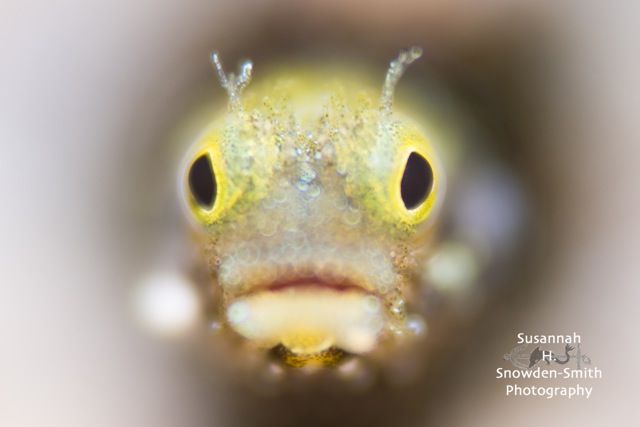
In an ongoing series, Scubaverse.com’s Underwater Photography Editors Nick and Caroline Robertson-Brown talk to underwater photographers from around the world that they admire.
This interview is with US photographer Susannah H. Snowden-Smith.
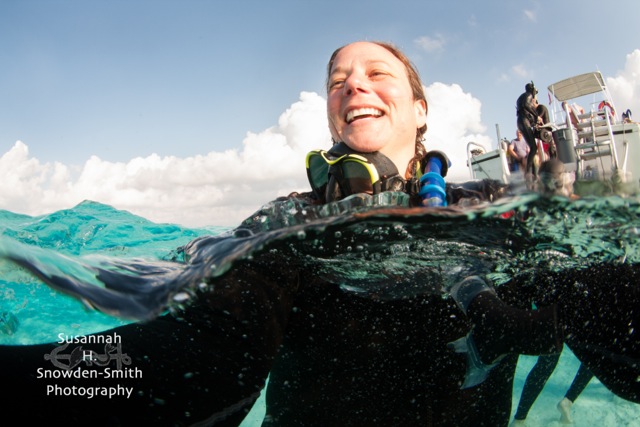
I’ve been diving for over 25 years, and photographing even longer. I started my professional photography career as a photojournalist. During my time at the newspaper I started photographing ancient shipwreck excavations part of the year. Combining my passions for diving and photography had always been the goal. With that in mind, three years ago, my husband and I moved to Grand Cayman so I could shoot underwater full-time.
My dad was an avid amateur photographer and I loved watching him shoot with his Olympus film camera. In my family, each of us got a camera when we turned ten. My sisters were all using 110 film cartridges in those skinny little cameras. But when the time came for me to get a camera of my own, I wanted “a camera like Dad has” and so my first camera was a 35mm, $35, point and shoot.
I worked as a photojournalist in the States for many years. In this work, I always sought out the unique angle, the interesting shot; my images were often referred to as “artistic”. I have taken this artistic approach with me to my underwater work (more on that in question 8, below). To date, I have photographed five underwater excavations all over the world. Since moving to Grand Cayman, I’ve expanded my underwater photography from specializing in underwater archaeology to include marine life, macro, fluorescence, modern wrecks, sharks, over-under shots…I love it all, and love shooting it all! I sell my underwater fine art photographs on Cayman and in the States.
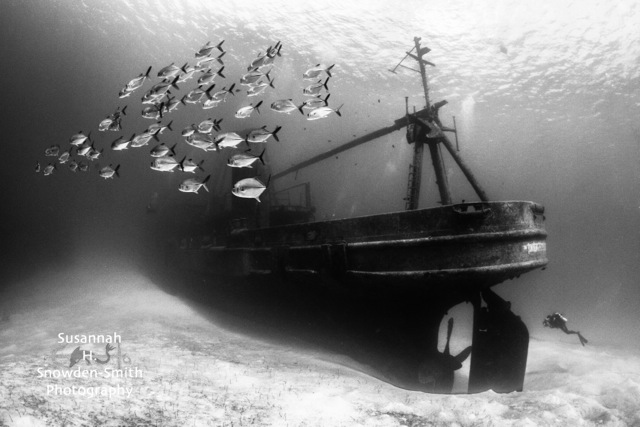
One of my proudest moments was having one of my underwater photographs from a 7th-Century BC Phoenician shipwreck displayed as part of an exhibit in the Metropolitan Museum Of Art. I also landed the cover of Archaeology Magazine (May-June 2016 issue).
I’ve placed in the Underwater Photographer Of The Year contest twice now (2016 and 2017). Seeing my Kittiwake photograph in newspapers around the world was a huge high! And I was “Wrecks Of The World” Champion for 2016: I worked really hard, shooting new images for the contest each month, so having all that hard work pay off was extremely gratifying. I also won all six places in the Scubashooters “Half & Half” contest last August. Split shots are one of my favourite types of shooting, so again, to have these images recognized was really gratifying.
Cayman is my backyard, so I dive here when I’m not traveling. I’ve dived and photographed in Sri Lanka, the Mediterranean, the Red Sea, the Maldives, Rhode Island, Thailand, the Bahamas… But I have so many more places I want to shoot!
You can find out more about my work at www.SusannahPhotography.com. Follow me on Instagram: SusannahPhotography and on Facebook: Susannah H. Snowden-Smith Photography.
N/C: How did your underwater photography start?
S H. S-S: My first underwater camera was a Sea&Sea Motormarine 35 when I was about 12. I’d saved up all my money for it! I took photographs in the local pool, trying to get interesting shots; this involved a lot of photographs of orange golf balls. Thinking back, I guess liked the contrast against the blue pool water. (My mom was not as impressed with the film processing costs and I soon took over paying for them 😉
Around that same time, in 6th-grade, we studied a small segment on underwater archaeology. I was fascinated and set a goal of working in underwater archaeology! I’ve since been the underwater photographer on five shipwreck excavations, from 7th C. Phoenician to 18th C. Ottoman. From underwater archaeology I’ve expanded into photographing marine life, macro, fluorescence, modern wrecks, sharks, over-under shots… I’m loving shooting everything from hammerhead sharks down to dwarf frogfish.
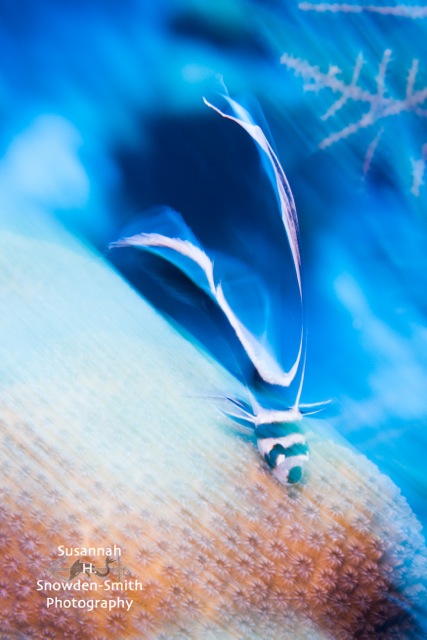
N/C: What is your favourite u/w camera equipment (past & present) & why?
S H. S-S: My Subal D500 housing and Sea&Sea YS-250s are favourites. I love the way the Subal housing feels in my hand. It’s ergonomic, the buttons are where I expect them to be, and it’s rugged. My Sea&Sea YS-250 strobes give out a huge amount of light and the quick recycling is a huge asset.
I love shooting and experimenting with remote strobes. I also love my Nightsea fluorescence kit.
I had a Sea&Sea MDX40 housing that I used for many years. It was very good to me, enabling me to make many images I am proud of.
N/C: What would be your advice to anyone new to underwater photography?
S H. S-S: Stick with it! It’s not going to be instant gratification, and there is so much to learn. I like to tell my students: you’re going to take half of what you know about land photography and chuck it out the window! Underwater photography has a steep learning curve, but the rewards are huge!
N/C: What, or who, has been your single biggest inspiration for your underwater photography?
S H. S-S: Alex Mustard and his work have been a big inspiration for me. I admire his creativity and how he’s always pushing the envelope of ingenuity. I find daily inspriration on Wetpixel, Scubashooters, UWPhotographers and from the scores of underwater photographers who are in my Facebook feed.
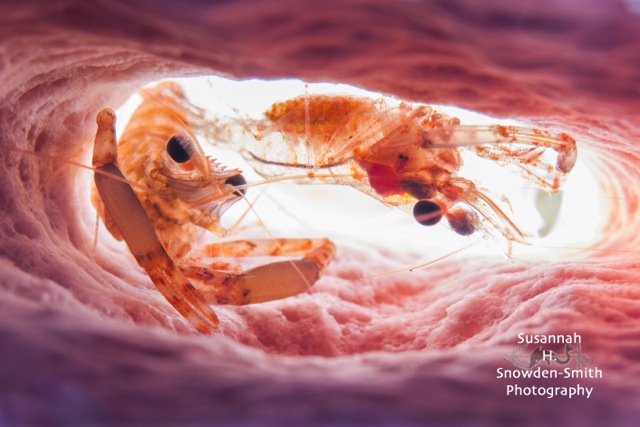
N/C: What image are you most proud of and why?
S H. S-S: That’s a hard one. I have photographs that mean a lot to me from different phases of my underwater photo career. I’ve included some of my favourite images for this article, but there are many more that I’m attached to.
N/C: Where is your favourite dive location, and is it for the photography?
S H. S-S: Photography and diving are inseparable for me: anywhere I love to dive, I love to photograph. I have so many favourite places, and so many more that I want to explore (see below). I love shooting in my Cayman backyard but I can’t wait to explore more of the world. I’m excited to get to SE Asia, hopefully soon, for the photo opportunities.
N/C: What are you views on marine life manipulation, moving subjects?
S H. S-S: I’ve been reading a lot about this recently. Horrifying!
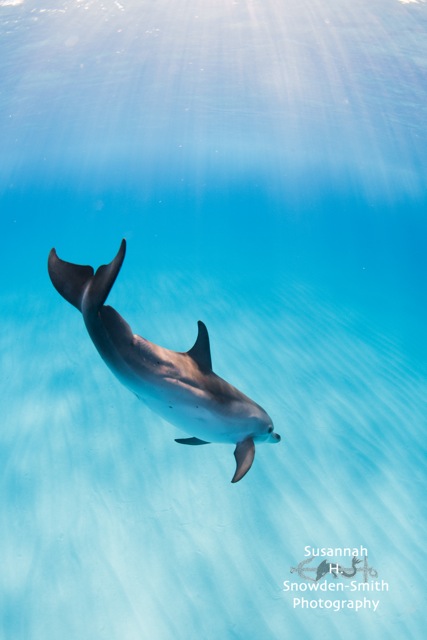
N/C: What do you look for when you are making your images?
S H. S-S: As noted above, I am always seeking out the unique angle or interesting way to shoot an image. When I was a photojournalist, I had to photograph the same events over and over again, e.g. the same parade each year. So the challenge was how to cover the same event but come back with fresh, different images each time. Newspaper readers who saw me shoot would joke that I could often be found climbing a tree, or lying on the ground in the middle of a parade. And it was true: I would do whatever it took in order to get the creative shot I had in my mind’s eye. I apply this same creative eye to my underwater work. I’m always asking myself, “how can I make this photo more interesting? How can I take a photo of this subject in a way that I’ve not conceived of before?”
For this, Cayman has been really good for me, pushing me forward in my work. Just like my time as a photojournalist, I’m often shooting the same subjects over and over, which forces me to try and look for a different, more creative image each time. It also means I can experiment to my heart’s content. So when I have with a new lighting technique I want to employ, I can try it out right away.
N/C: What motivates you to take u/w photos?
S H. S-S: A desire to produce creative and unique images. Pushing myself to always improve. Sharing the excitement of the underwater world.
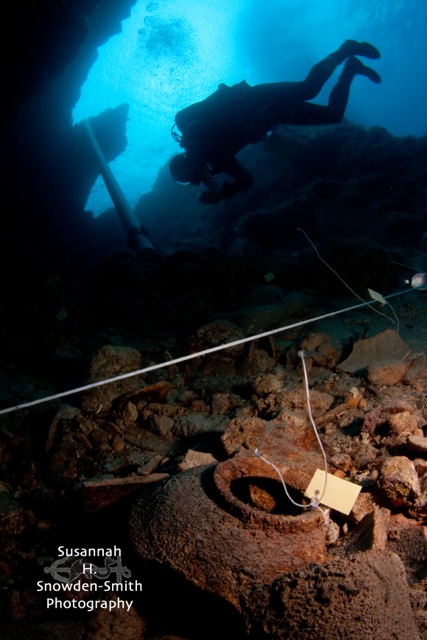
N/C: If you could photograph any one thing/place what or where would that be?
S H. S-S: I have many places and things I’d like to photograph, so narrowing that down to one is impossible. But in the immediate future, I’d like to dive and photograph the wrecks of Truk Lagoon, macro life in the Philippines and Indo, whales and whale sharks…! 😀 I’m looking forward to it all!!
Blogs
Northern Red Sea Reefs and Wrecks Trip Report, Part 2: Wall to Wall Wrecks
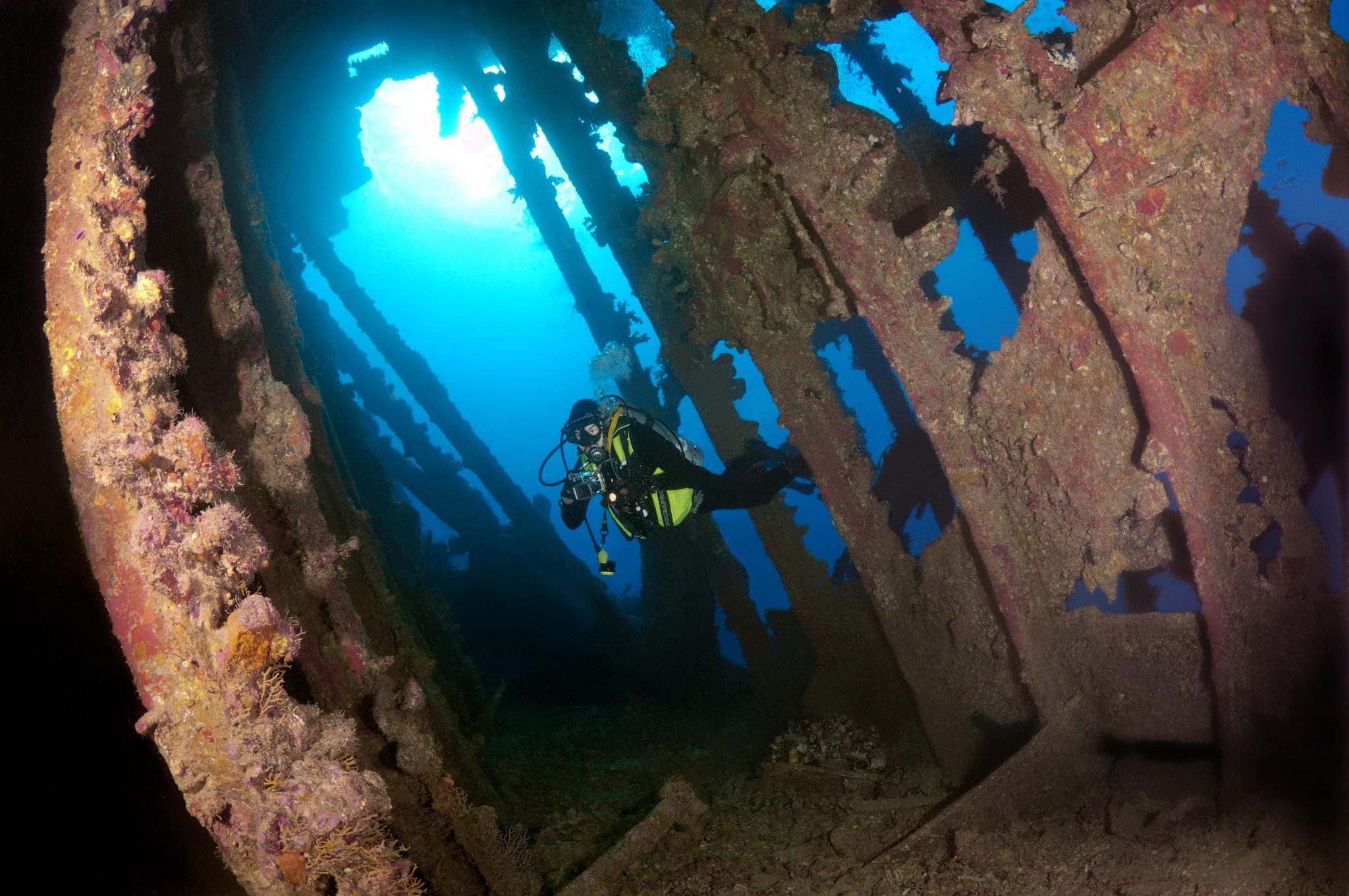
Jake Davies boards Ghazala Explorer for an unforgettable Red Sea diving experience…
The second day’s diving was a day full of wreck diving at Abu Nuhas, which included the Chrisoula K, Carnatic, and Ghiannis D. The first dive of the day was onto the Chrisoula K, also known as the wreck of tiles. The 98m vessel remains largely intact where she was loaded with tiles which can be seen throughout the hold. The stern sits at 26m and the bow just below the surface. One of the highlights of the wreck is heading inside and seeing the workroom where the machinery used for cutting the tiles are perfectly intact. The bow provided some relaxing scenery as the bright sunlight highlighted the colours of the soft coral reef and the many reef fish.
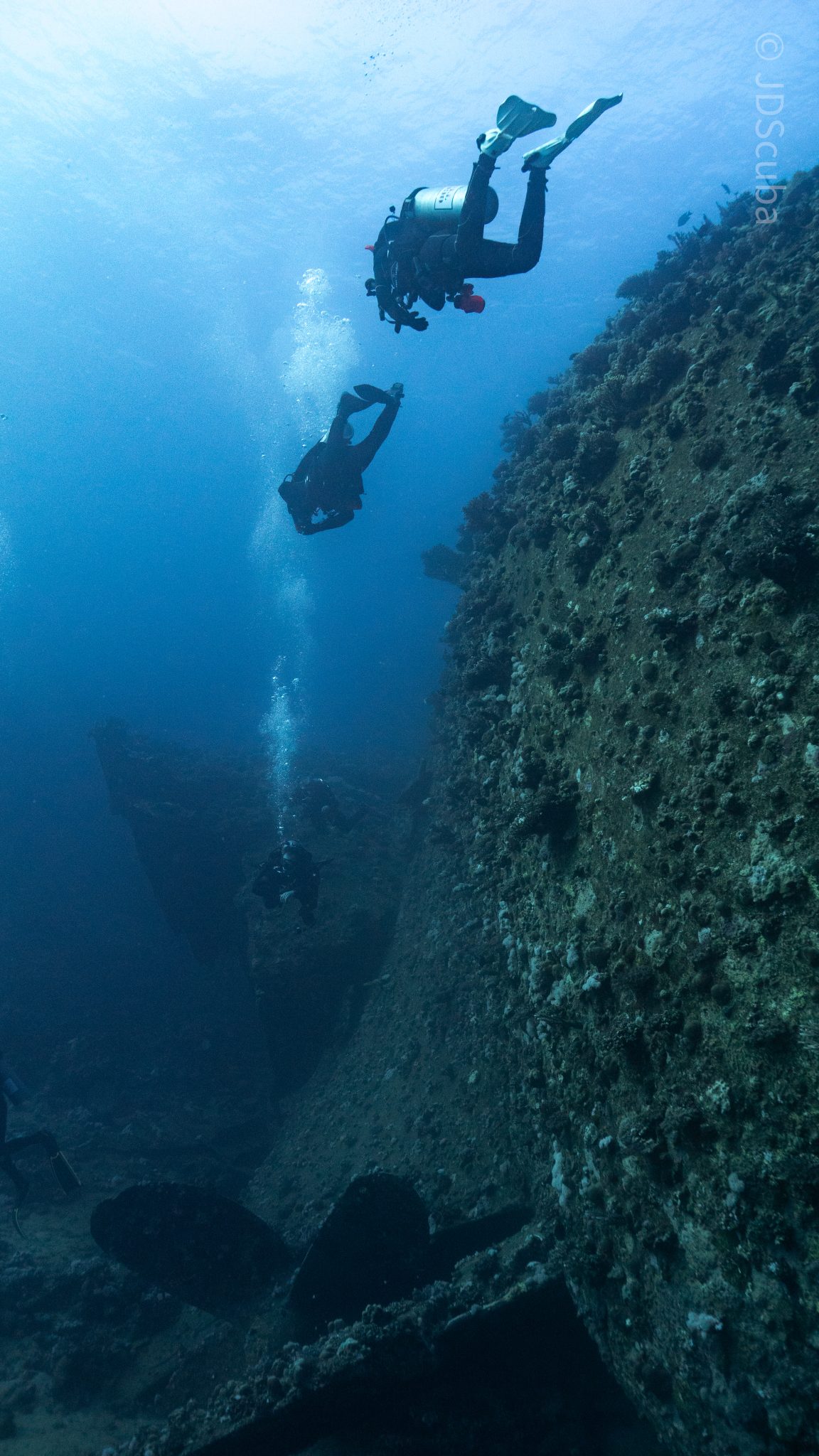
Following breakfast, we then headed to the next wreck, which was the Carnatic. The Carnatic is an 89.9m sail steamer vessel that was built in Britain back in 1862. She ran aground on the reef back in 1869 and remains at 27m. At the time, she was carrying a range of items, including 40,000 sterling in gold. An impressive wreck where much of the superstructure remains, and the two large masts lay on the seafloor. The wooden ribs of the hull provide structures for lots of soft corals, and into the stern section, the light beams through, bouncing off the large shoals of glass fish that can be found using the structure as shelter from the larger predators that are found outside of the wreck.
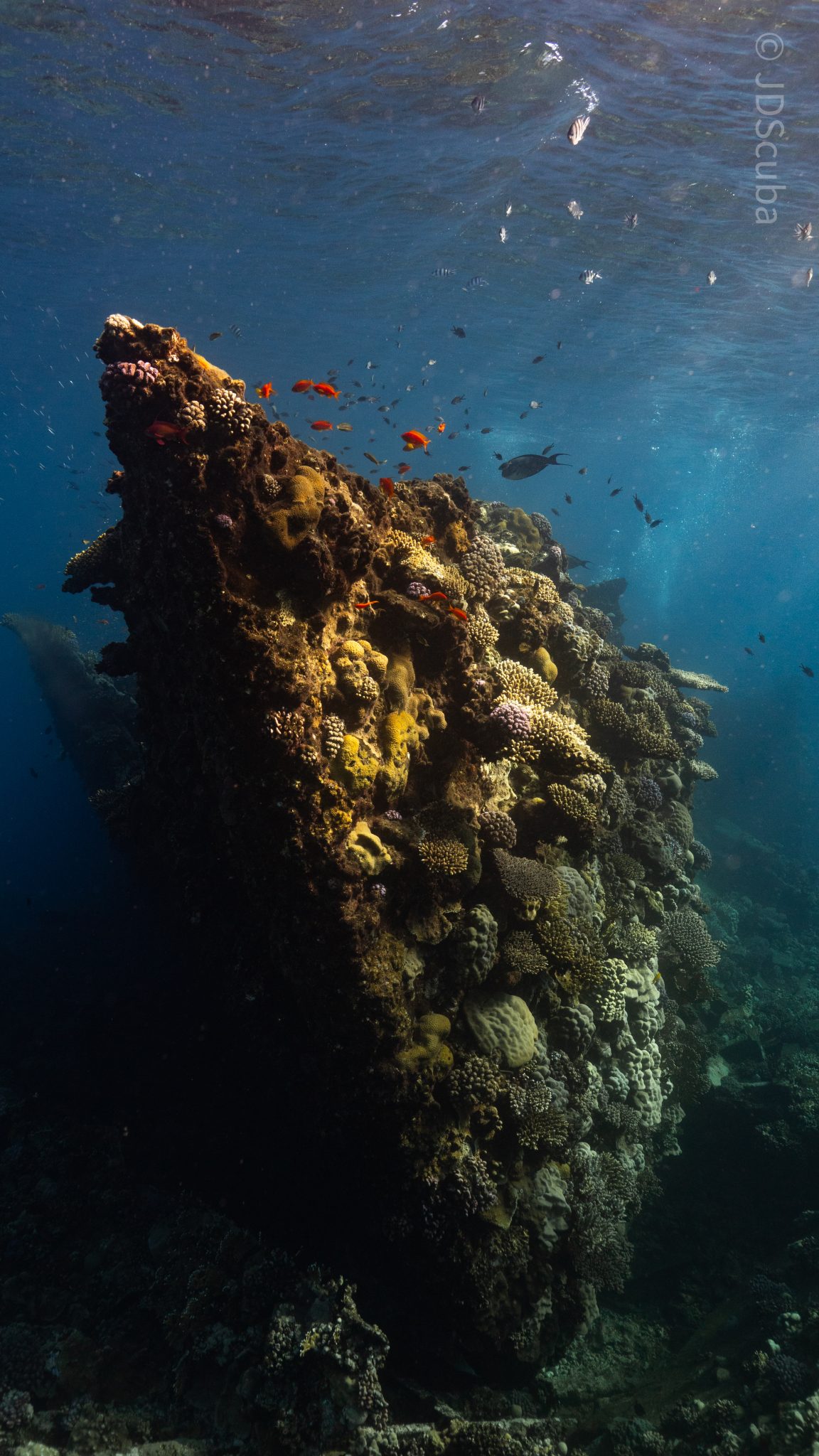
The final wreck at Abu Nuhas was the Ghiannis D, originally called ‘Shoyo Maru,’ which was 99.5m long and built in Japan back in 1969 before becoming a Greek-registered cargo ship in 1980. The ship then ran aground on the reef on April 19th, 1983, and now sits at the bottom at a depth of 27m. Heading down the line, the stern of the ship remains in good condition compared to the rest of the hull. The highlight of the wreck, though, is heading into the stern section and down the flights of stairs to enter the engine room, which remains in good condition and is definitely worth exploring. After exploring the interior section of the ship, we then headed over to see the rest of the superstructure, where it’s particularly interesting to see the large table corals that have grown at the bow relatively quickly considering the date the ship sank. After surfacing and enjoying some afternoon snacks, we made sure everything was strapped down and secured as we would be heading north and crossing the Gulf of Suez, where the winds were still creating plenty of chop.
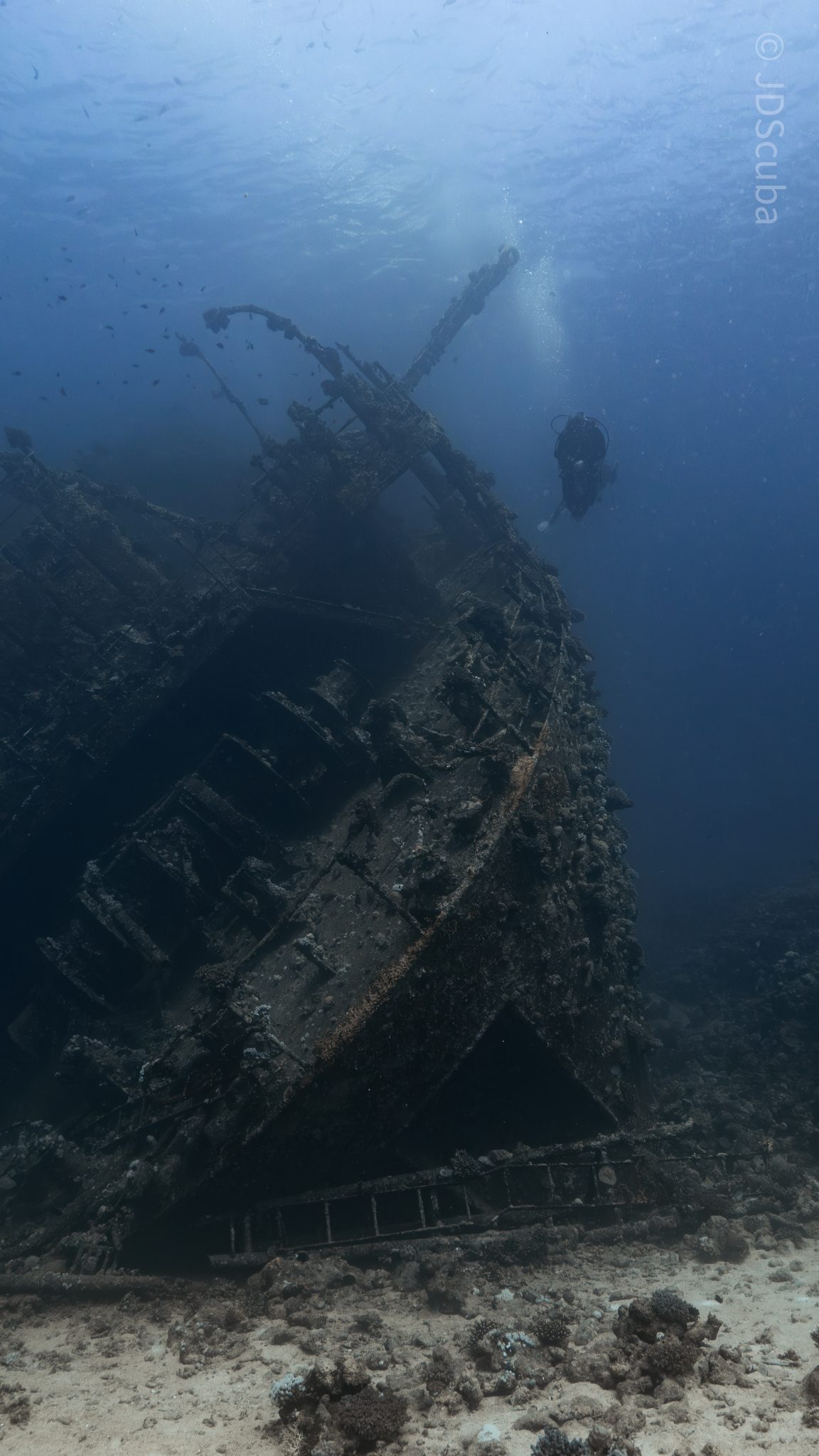
The next morning, it was a short hop to Ras Mohammed Nature Reserve for the next couple of days of diving. The 6am wake-up call came along with the briefing for the first site we would be diving, which was Shark & Yolanda. The low current conditions allowed us to start the dive at Anemone City, where we would drift along the steep, coral-filled wall. These dives involved drifts, as mooring in Ras Mohammed wasn’t allowed to protect the reefs. As a dive site, Shark & Yolanda is well-known and historically had a lot of sharks, but unfortunately not so many in recent years, especially not so early in the season. However, there was always a chance when looking out into the blue.
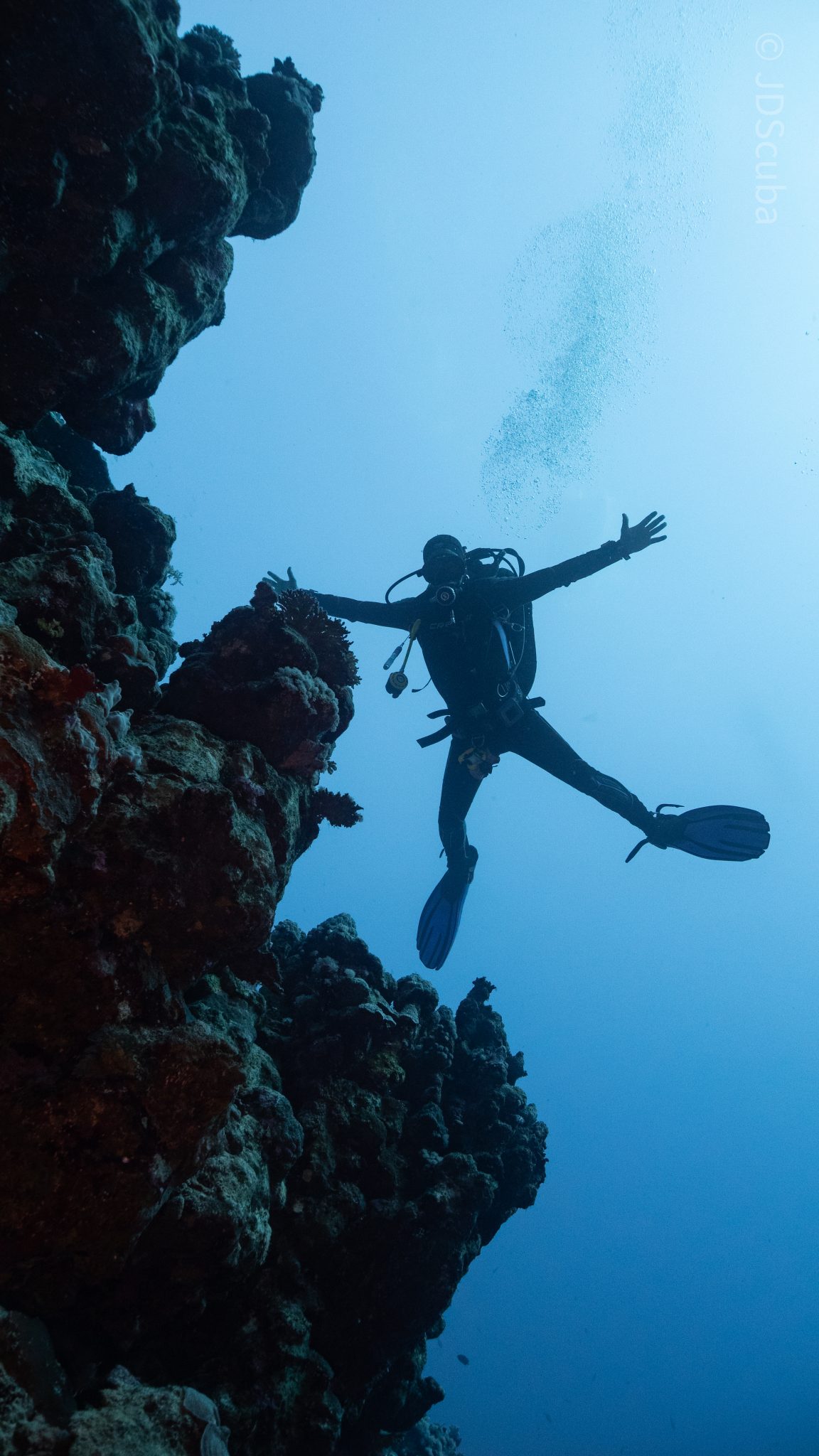
The gentle drift took us along the steep walls of the site, with plenty of anemone fish to be seen and a huge variety of corals. It wasn’t long into the dive before we were accompanied by a hawksbill turtle, who drifted with us between the two atolls before parting ways. Between the two reefs, the shallow patch with parts of coral heads surrounded by sand provided the chance to see a few blue-spotted stingrays that were mainly resting underneath the corals and are always a pleasure to see. With this being the morning dive, the early sunlight lit up the walls, providing tranquil moments. Looking out into the blue, there was very little to be seen, but a small shoal of batfish shimmering underneath the sunlight was a moment to capture as we watched them swim by as they watched us.
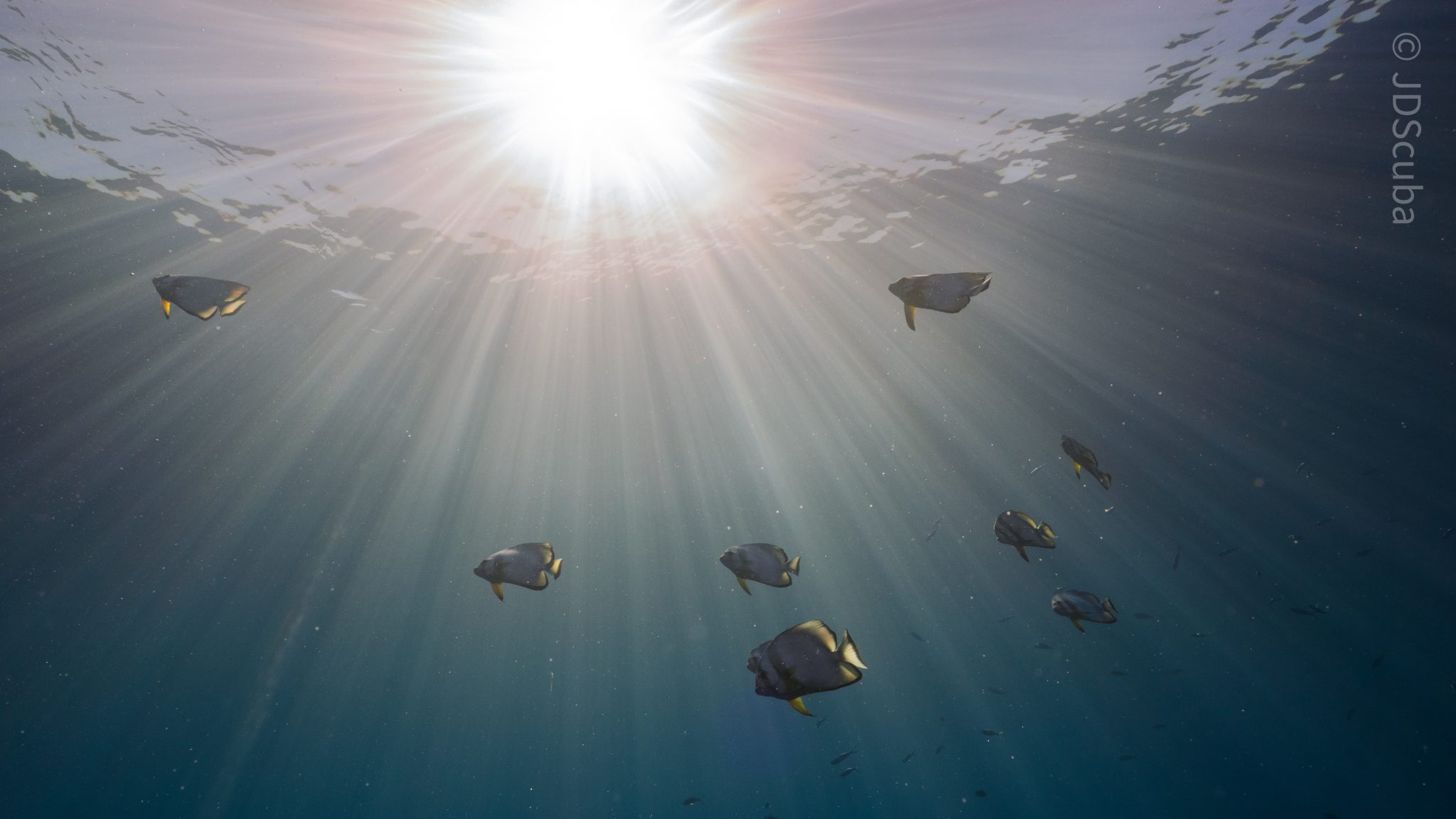
Towards the end of the dive, we stopped at the wreck of the Jolanda where the seafloor was scattered with toilets from the containers it was carrying. This provided a unique site to make a safety stop, which was also accompanied by a large barracuda slowly swimming by, along with a hawksbill turtle calmly swimming over the reef as the sun rays danced in the distance.
For the next dive, we headed north to the Strait of Tiran to explore the reefs situated between Tiran Island and Sharm El Sheik, which were named after the British divers who had found them. We started on Jackson before heading to Gordons Reef, where we also did the night dive. All the atolls at these sites provided stunning, bustling coral reefs close to the surface and steep walls to swim along, which always provided the opportunity to keep an eye out for some of the larger species that can be seen in the blue. Midwater around Jackson Reef was filled with red-toothed triggerfish and shoals of banner fish, which at times were so dense that you couldn’t see into the blue. Moments went by peacefully as we enjoyed the slow drift above the reef, watching these shoals swim around under the mid-afternoon sun.
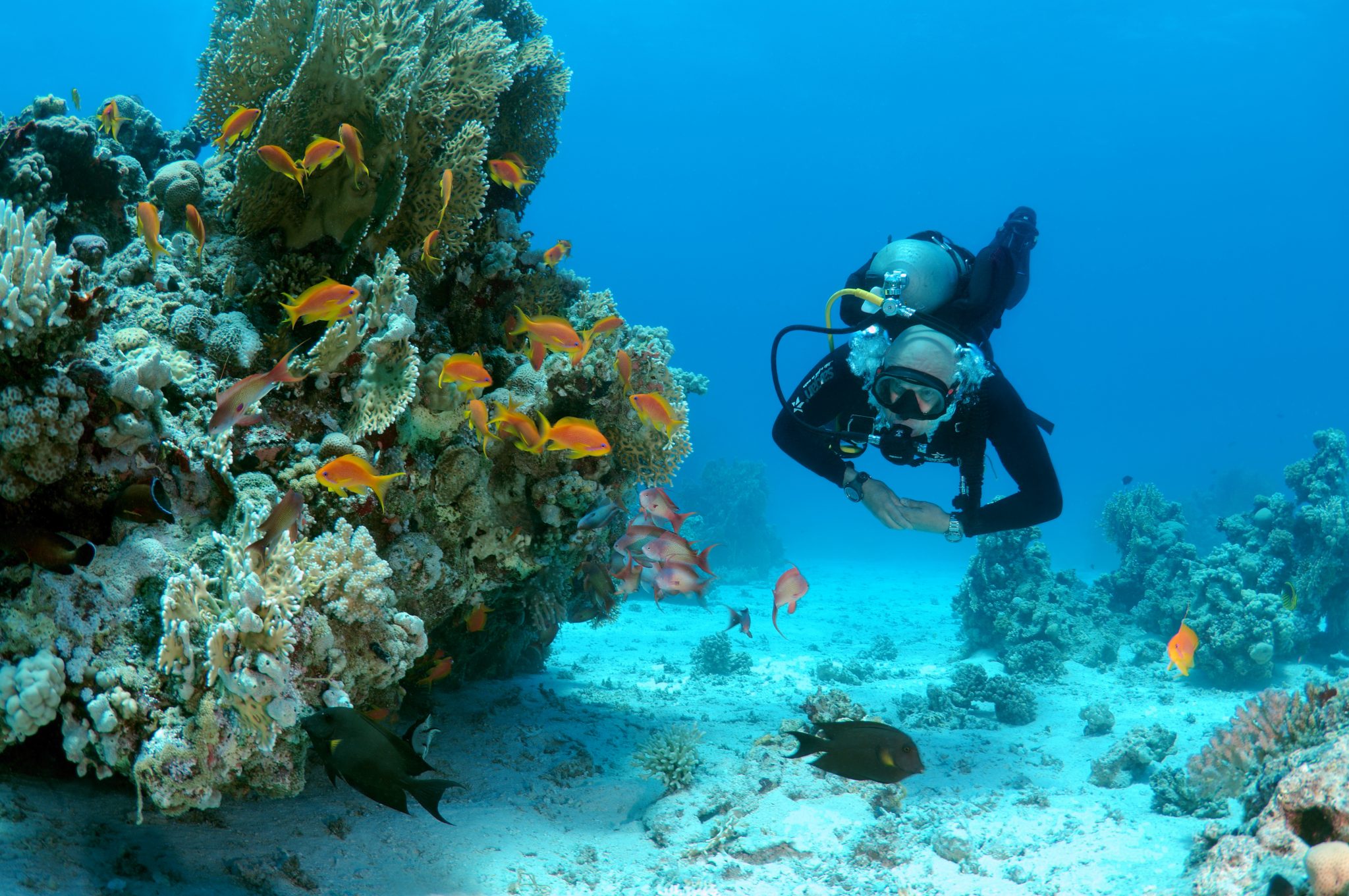
The night dive at Gordon’s Reef was mainly among the stacks of corals surrounded by sand, which was great to explore under the darkness. After some time circling the corals, we came across what we were really hoping to find, and that was an octopus hunting on the reef. We spent the majority of the dive just watching it crawl among the reef, blending into its changing surroundings through changes in colour and skin texture. It’s always so fascinating and captivating to watch these incredibly intelligent animals, in awe of their ability to carry out these physical changes to perfectly blend into the reef. Before we knew it, it was time to head back to the boat to enjoy a well-deserved tasty dinner prepared by the talented chefs onboard.
Check in for the 3rd and final part of this series from Jake tomorrow!
To find out more about the Northern Red Sea reef and wrecks itineraries aboard Ghazala Explorer, or to book, contact Scuba Travel now:
Email: dive@scubatravel.com
Tel: +44 (0)1483 411590
Photos: Jake Davies / Avalon.Red
Marine Life & Conservation
Double Bubble for Basking Sharks

 The Shark Trust is excited to announce that, for two more days only, all donations, large or small, will be doubled in the Big Give Green Match Fund!
The Shark Trust is excited to announce that, for two more days only, all donations, large or small, will be doubled in the Big Give Green Match Fund!
Donate to Basking in Nature: Sighting Giants
The Shark Trust is hoping to raise £10k which will be doubled to £20k. This will go towards Basking in Nature: Sighting Giants. And they need YOUR help to reach they’re goal.
The Shark Trust’s citizen science project is to monitor and assess basking sharks through sightings; encouraging data collection, community engagement, and promoting nature accessibility. This initiative aims to enhance health and wellbeing by fostering a deeper connection with British Sharks.
Campaign Aims
- Increase citizen science reporting of Basking Sharks and other shark sightings to help inform shark and ray conservation.
- Provide educational talks about the diverse range of sharks and rays in British waters and accessible identification guides!
- Create engaging and fun information panels on how to ID the amazing sharks and rays we have on our doorstep! These can be used on coastal paths around the Southwest. With activities and information on how you can make a difference for sharks and rays!
- Promote mental wellbeing through increasing time in nature and discovering the wonders beneath the waves!
Donate, and double your impact. Click Here
-

 News3 months ago
News3 months agoHone your underwater photography skills with Alphamarine Photography at Red Sea Diving Safari in March
-

 News3 months ago
News3 months agoCapturing Critters in Lembeh Underwater Photography Workshop 2024: Event Roundup
-

 Marine Life & Conservation Blogs2 months ago
Marine Life & Conservation Blogs2 months agoCreature Feature: Swell Sharks
-

 Blogs2 months ago
Blogs2 months agoMurex Resorts: Passport to Paradise!
-

 Blogs2 months ago
Blogs2 months agoDiver Discovering Whale Skeletons Beneath Ice Judged World’s Best Underwater Photograph
-

 Gear Reviews2 months ago
Gear Reviews2 months agoGear Review: Oceanic+ Dive Housing for iPhone
-

 Marine Life & Conservation2 months ago
Marine Life & Conservation2 months agoSave the Manatee Club launches brand new webcams at Silver Springs State Park, Florida
-

 News3 months ago
News3 months agoWorld’s Best Underwater Photographers Unveil Breathtaking Images at World Shootout 2023

















